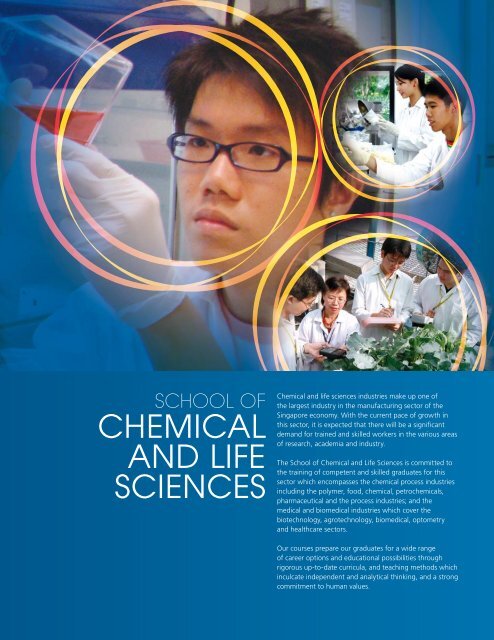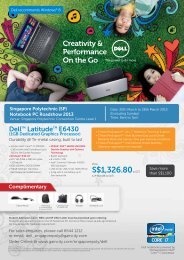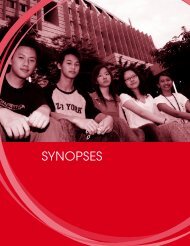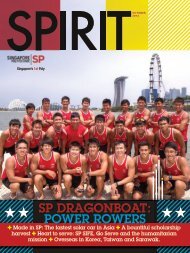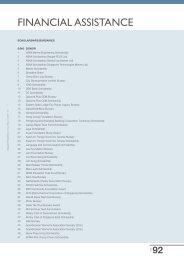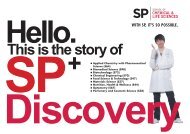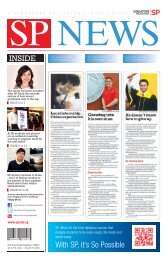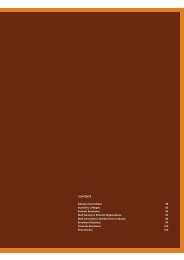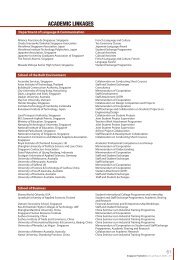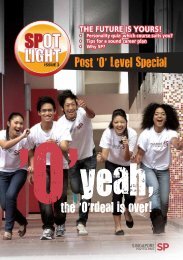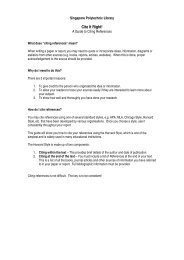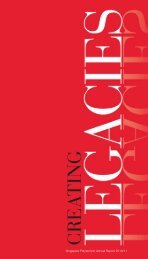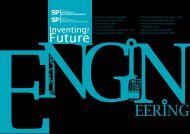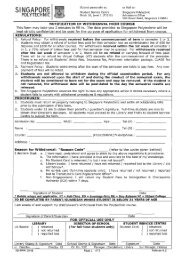CHEMICAL AND LIFE SCIENCES - Singapore Polytechnic
CHEMICAL AND LIFE SCIENCES - Singapore Polytechnic
CHEMICAL AND LIFE SCIENCES - Singapore Polytechnic
You also want an ePaper? Increase the reach of your titles
YUMPU automatically turns print PDFs into web optimized ePapers that Google loves.
SCHOOL OF Chemical and life sciences<br />
SCHOOL OF<br />
<strong>CHEMICAL</strong><br />
<strong>AND</strong> <strong>LIFE</strong><br />
<strong>SCIENCES</strong><br />
Chemical and life sciences industries make up one of<br />
the largest industry in the manufacturing sector of the<br />
<strong>Singapore</strong> economy. With the current pace of growth in<br />
this sector, it is expected that there will be a significant<br />
demand for trained and skilled workers in the various areas<br />
of research, academia and industry.<br />
The School of Chemical and Life Sciences is committed to<br />
the training of competent and skilled graduates for this<br />
sector which encompasses the chemical process industries<br />
including the polymer, food, chemical, petrochemicals,<br />
pharmaceutical and the process industries; and the<br />
medical and biomedical industries which cover the<br />
biotechnology, agrotechnology, biomedical, optometry<br />
and healthcare sectors.<br />
Our courses prepare our graduates for a wide range<br />
of career options and educational possibilities through<br />
rigorous up-to-date curricula, and teaching methods which<br />
inculcate independent and analytical thinking, and a strong<br />
commitment to human values.<br />
<strong>Singapore</strong> <strong>Polytechnic</strong> Prospectus 2008/2009 107
SCHOOL OF Chemical and life sciences<br />
The School offers six Diploma courses,<br />
three Advanced Diploma and five Specialist<br />
Diploma courses. The complete list of<br />
courses with options is as follows:<br />
Diploma Courses<br />
• Diploma in Biomedical Science<br />
(Cardiac Technology)<br />
• Diploma in Biomedical Science<br />
(Medical Technology)<br />
• Diploma in Biotechnology<br />
• Diploma in Chemical Engineering<br />
• Diploma in Chemical Process Technology<br />
(Industrial Chemistry)<br />
• Diploma in Chemical Process Technology<br />
(Polymer Technology)<br />
• Diploma in Food Science & Technology<br />
• Diploma in Optometry<br />
Advanced Diploma Courses<br />
• Advanced Diploma in Food Technology<br />
• Advanced Diploma in Polymer Technology<br />
• Advanced Diploma in Optometry<br />
Specialist Diploma Courses<br />
• Specialist Diploma in Biotechnology<br />
• Specialist Diploma in Cervical Cytology<br />
• Specialist Diploma in Cosmetic Science<br />
• Specialist Diploma in Haematology and<br />
Blood Banking<br />
• Specialist Diploma in Microbiology<br />
Details on entry requirements of all courses<br />
are found in the Admissions chapter of<br />
this prospectus.<br />
Practical Training<br />
The School has excellent laboratory<br />
facilities equipped with the latest<br />
equipment and experimental set-ups to<br />
provide students with valuable handson<br />
experience. This is supplemented by<br />
industrial training, internship programmes<br />
or clinical attachment of various periods for<br />
different diplomas. Our students can also<br />
gain international exposure through the<br />
Overseas Industrial Training Programme.<br />
Diploma in Biomedical Science<br />
<strong>Singapore</strong>’s goal to become Asia’s premier<br />
healthcare hub and the significant growth<br />
of the biomedical sciences industry make<br />
the Diploma in Biomedical Science a<br />
much sought after qualification and the<br />
obvious choice.<br />
Biomedical Science is a broad collection<br />
of scientific disciplines focused on testing,<br />
diagnosis, management and prevention<br />
of diseases.<br />
At <strong>Singapore</strong> <strong>Polytechnic</strong>, the three-year<br />
full-time Diploma in Biomedical Science<br />
offers two areas of specialisation: Medical<br />
Technology and Cardiac Technology.<br />
The Medical Technology option aims<br />
to train skilled technologists in clinical<br />
laboratory testing as well as biomedical<br />
research. The Medical Technology<br />
curriculum builds on a basic foundation<br />
in the biological sciences towards indepth<br />
theoretical and hands-on practical<br />
training in all aspects of medical laboratory<br />
science including medical microbiology,<br />
immunology, haematology, transfusion<br />
science, clinical chemistry, clinical molecular<br />
diagnostics and genetics. Research skills<br />
necessary for work in research and<br />
development are also emphasised via<br />
project work.<br />
The Cardiac Technology option is designed<br />
to train professionally competent cardiac<br />
technologists to work in a specialised<br />
niche in the healthcare industry. Cardiac<br />
technologists provide technical services<br />
in the investigation, diagnosis and<br />
management of heart diseases. With<br />
the National Heart Centre as our partner<br />
in training, our students will receive a<br />
comprehensive foundation in medical<br />
laboratory and life sciences as well as<br />
excellent hands-on training in a real-life<br />
clinical environment.<br />
Career Prospects<br />
The biomedical sciences feature<br />
prominently on the government’s agenda.<br />
Employment opportunities are excellent<br />
as the volume of clinical diagnostic tests<br />
continues to increase with both population<br />
growth and the development of new types<br />
of tests and treatment protocols.<br />
For graduates in the Medical Technology<br />
option, a challenging career awaits them<br />
in medical laboratories where they carry<br />
out scientific tests that aid in disease<br />
diagnosis and often assist in saving lives.<br />
Graduates of the Cardiac Technology<br />
option are well suited for employment in<br />
the cardiology department of hospitals<br />
108 <strong>Singapore</strong> <strong>Polytechnic</strong> Prospectus 2008/2009
SCHOOL OF Chemical and life sciences<br />
and in private practices where they carry<br />
out tests for diagnosis and management of<br />
heart diseases. Employment opportunities<br />
for our biomedical science graduates can<br />
also be found in institutions conducting<br />
disease surveillance, forensics and<br />
regulatory testing, and pharmaceutical<br />
research and production. Graduates can<br />
work as technical specialists or in sales<br />
and marketing for the medical diagnostics,<br />
pharmaceutical and healthcare sectors.<br />
Industrial Training /<br />
Clinical Attachment<br />
Under the industrial training programme,<br />
Medical Technology option students will be<br />
posted to medical laboratories in hospitals<br />
and related healthcare establishments<br />
for their clinical rotation and Cardiac<br />
Technology option students will be posted<br />
to the National Heart Centre for their<br />
clinical attachment.<br />
Course Modules<br />
Full-Time First Year<br />
Hours<br />
Stage 1A<br />
CP2036 Biosystems & Biomolecules 60<br />
CP2038 Anatomy & Physiology I 45<br />
CP2049 Biophysics 45<br />
CP4001 Analytical & Physical Chemistry 60<br />
LC0218 Critical Reasoning Skills 30<br />
MS2101 Mathematics A 60<br />
SP0201 Character Development 30<br />
General Elective Module 1<br />
(Semester 2) 30<br />
Stage 1B<br />
CP2007 Basic Microbiology 75<br />
CP2037 Cell Biology 75<br />
CP4006 Inorganic & Organic Chemistry 75<br />
LC0203 Report Writing & Presentation 30<br />
MS2103 Mathematics B 60<br />
SP0202 Innovation, Design &<br />
Enterprise in Action 30<br />
General Elective Module 1<br />
(Semester 2) 30<br />
MEDICAL TECHNOLOGY OPTION<br />
Full-Time Second Year<br />
Stage 2A<br />
CP2013 Biochemical Techniques 75<br />
CP2041 Clinical Chemistry 1 60<br />
CP2042 Basic Immunology 45<br />
CP2046 Medical Microbiology A 75<br />
CP2070 Cinical Instrumentation &<br />
Automation 60<br />
MS2230 Biostatistics 60<br />
General Elective Module 2 30<br />
Stage 2B<br />
CP2008 Metabolic Biochemistry 75<br />
CP2029 Basic Pathology 60<br />
CP2043 Haematology 1 60<br />
CP2044 Anatomy & Physiology 2 45<br />
CP2063 Genetics & Molecular Biology 75<br />
CP2069 Environmental Science 60<br />
General Elective Module 3 30<br />
IS1006 Industrial Training Programme<br />
Full-Time Third Year<br />
Stage 3A<br />
CP202Z Project* 60<br />
CP2034 Blood Banking 60<br />
CP2035 Histological Techniques 60<br />
CP2045 Haematology 2 75<br />
CP2067 Pathobiology of Human Diseases 45<br />
LC0209 Communication Skills for<br />
Health Professionals 30<br />
General Elective Module 4 30<br />
Stage 3B<br />
CP202Z Project* 60<br />
CP2033 Applied Immunology 75<br />
CP2047 Clinical Chemistry 2 75<br />
CP2048 Medical Microbiology B 75<br />
CP2053 Techniques in Clinical<br />
Molecular Diagnostics 45<br />
CP2060 Laboratory Management &<br />
Biosafety 45<br />
Elective Modules<br />
CP2040 Good Laboratory &<br />
Manufacturing Practice 45<br />
CP2052 Introductory Pharmacology 30<br />
CARDIAC TECHNOLOGY OPTION<br />
Full-Time Second Year<br />
Stage 2A<br />
CP2041 Clinical Chemistry 1 60<br />
CP2046 Medical Microbiology A 75<br />
CP2060 Laboratory Management &<br />
Biosafety 45<br />
CP2063 Genetics & Molecular Biology 75<br />
MS2230 Biostatistics 60<br />
General Elective Module 2 30<br />
General Elective Module 3 30<br />
Stage 2B<br />
CT001Z Clinical Attachment<br />
CP2052 Introductory Pharmacology 30<br />
CP2062 Pharmacology Mathematics 30<br />
CT0012 Applied Cardiac Anatomy &<br />
Physiology 60<br />
CT0013 General Cardiology & Cardiac<br />
Disorders 1 60<br />
CT0014 ECG, Stress Tests & Rhythm<br />
Disorders 90<br />
LC0209 Communication Skills for<br />
Health Professionals 30<br />
General Elective Module 4 30<br />
Full-Time Third Year<br />
A close look at medical imaging.<br />
Stage 3A<br />
CT001Z Clinical Attachment<br />
CT0015 Diagnostic & Interventional<br />
Cardiac Catheterisation 90<br />
CT0016 General Cardiology & Cardiac<br />
Disorders 2 60<br />
CT0017 Echocardiography 90<br />
CT0018 Electrophysiology & Pacemakers 90<br />
CT0019 Cardiac Pharmacology,<br />
Nuclear Cardiology & Others 60<br />
Stage 3B<br />
CP2008 Metabolic Biochemistry 75<br />
CP2029 Basic Pathology 60<br />
CP2042 Basic Immunology 45<br />
CP2047 Clinical Chemistry 2 75<br />
CP2058 Immunohaematology 75<br />
* Modules covered in two semesters<br />
<strong>Singapore</strong> <strong>Polytechnic</strong> Prospectus 2008/2009 109
SCHOOL OF Chemical and life sciences<br />
Course Modules<br />
Diploma in Biotechnology<br />
The Diploma in Biotechnology course<br />
focuses on many areas of growth in the<br />
life sciences. The Biotechnology curriculum<br />
provides a strong foundation in cell biology,<br />
microbiology, chemistry, biochemistry<br />
and mathematics. In addition, students<br />
are expected to cover modules such as<br />
biophysics, plant sciences, molecular<br />
biology, microbial genetics, animal and<br />
plant tissue culture, plant biotechnology,<br />
agrotechnology, applied microbiology,<br />
hybridoma technology, immunology,<br />
genomic techniques, biostatistics and<br />
bioinformatics databases and tools.<br />
Students will learn how to manipulate<br />
nucleic acids, conduct genome analysis and<br />
produce enzymes, monoclonal antibodies,<br />
antibiotics and other organic molecules.<br />
Biosafety aspects of clinical, research<br />
laboratories and hospitals are also covered<br />
to create a culture of safety for all students.<br />
Communication skills and report writing<br />
modules prepare students for work and/or<br />
university education.<br />
At <strong>Singapore</strong> <strong>Polytechnic</strong> there is a<br />
strong emphasis on practical hands-on<br />
training in well-equipped laboratories.<br />
Facilities include specialist suites for<br />
microbiology, hybridoma, animal cell<br />
culture, biochemistry, plant tissue culture,<br />
fermentation and bioprocess studies,<br />
molecular biology and genomic techniques.<br />
These facilities house sophisticated<br />
instrumentation and equipment such as<br />
DNA sequencer, polymerase chain reaction<br />
thermal cyclers, real-time PCR machines,<br />
electro-cell fusion apparatus, biosafety<br />
cabinets, electrophoresis units, electron<br />
transmission, fluorescent and scanning<br />
electron microscopes, ultracentrifuge, tissue<br />
processors and a variety of fermenters<br />
and bioreactors. Facilities in the Solarium<br />
provide training in hydroponics and<br />
aeroponics while training in selective<br />
breeding of ornamental fish is undertaken<br />
in the Aquaculture Unit.<br />
Career Prospects<br />
With the increasing emphasis on Life<br />
Sciences in <strong>Singapore</strong>, graduates of<br />
the Diploma in Biotechnology are well<br />
placed for employment in the biomedical<br />
sciences sector and related areas of<br />
research and development. They will be<br />
able to achieve a level of satisfaction in<br />
niche areas of cutting-edge research;<br />
especially in new start-up companies<br />
involved in biotechnology, pharmaceutical,<br />
agricultural and healthcare products and<br />
services. Other career opportunities are<br />
also available in the public sectors in the<br />
National Environment Agency, Ministry of<br />
Education, National Parks Board and Agri-<br />
Food & Veterinary Authority, etc.<br />
Industrial Training<br />
Under the industrial training programme,<br />
biotechnology students can look forward to<br />
the opportunity of attachments at selected<br />
hospitals, biomedical science laboratories,<br />
research laboratories and biotechnology<br />
related establishments. Overseas<br />
attachments are also available. This will<br />
inculcate a global mindset in our students.<br />
Full-Time First Year<br />
Hours<br />
Stage 1A<br />
CP2036 Biosystems & Biomolecules 60<br />
CP2038 Anatomy & Physiology I 45<br />
CP2049 Biophysics 45<br />
CP4001 Analytical & Physical Chemistry 60<br />
LC0218 Critical Reasoning Skills 30<br />
MS2101 Mathematics A 60<br />
SP0201 Character Development 30<br />
General Elective Module 1<br />
(Semester 2) 30<br />
Stage 1B<br />
CP2007 Basic Microbiology 75<br />
CP2037 Cell Biology 75<br />
CP4006 Inorganic & Organic Chemistry 75<br />
LC0203 Report Writing & Presentation 30<br />
MS2103 Mathematics B 60<br />
SP0202 Innovation, Design &<br />
Enterprise in Action 30<br />
General Elective Module 1<br />
(Semester 2) 30<br />
Full-Time Second Year<br />
Stage 2A<br />
CP2003 Plant Sciences 45<br />
CP2009 Molecular Genetics 60<br />
CP2011 Applied Microbiology 60<br />
CP2013 Biochemical Techniques 75<br />
CP4062 Organic Synthesis &<br />
Reaction Mechanisms 60<br />
MS2230 Biostatistics 60<br />
General Elective Module 2 30<br />
IS1006 Industrial Training Programme<br />
Stage 2B<br />
CP2008 Metabolic Biochemistry 75<br />
CP2016 Molecular Biology 75<br />
CP2044 Anatomy & Physiology 2 45<br />
CP2060 Laboratory Management &<br />
Biosafety 45<br />
CP2069 Environmental Science 60<br />
CP4009 Basic Instrumental Analysis 60<br />
General Elective Module 3 30<br />
IS1006 Industrial Training Programme<br />
Full-Time Third Year<br />
Stage 3A<br />
CP201Z Project* 60<br />
CP2022 Animal Cell Culture 60<br />
CP2023 Bioprocess Engineering 60<br />
CP2055 Genomic Techniques 75<br />
CP2056 Plant Biotechnology 60<br />
CP2068 WWW Bioinformatics 30<br />
LC0206 Oral Communication 30<br />
General Elective Module 4 30<br />
Stage 3B<br />
CP201Z Project* 60<br />
CP2024 Hybridoma Technology 75<br />
CP2025 Immunology 75<br />
CP2040 Good Laboratory &<br />
Manufacturing Practice 45<br />
CP2051 Molecular Modelling 30<br />
CP2054 Agrotechnology 60<br />
LC0214 Communication Skills for Work 30<br />
* Modules covered in two semesters<br />
110 <strong>Singapore</strong> <strong>Polytechnic</strong> Prospectus 2008/2009
SCHOOL OF Chemical and life sciences<br />
development, design and control, project<br />
management, environmental and energy<br />
management, research and development,<br />
marketing and technical sales, etc.<br />
Internship Programme<br />
Diploma in Chemical Engineering<br />
Chemical Engineering is an important<br />
discipline in the management of the<br />
Chemical Process industry. The Chemical<br />
Process industry covers a wide range of<br />
manufacturing industries, with products<br />
as diverse as petrochemicals, specialty<br />
chemicals, pharmaceuticals, semiconductors<br />
as well as food and healthcare products.<br />
Critical operational issues include process<br />
optimisation, environmental management,<br />
energy conservation and workplace safety.<br />
Running these industries efficiently and<br />
safely in a cost effective way demands<br />
exceptional talent and skills.<br />
Chemical Engineering technologists need<br />
to be good communicators who are quick<br />
learners and self-motivated individuals who<br />
work well in teams and able to work under<br />
pressure. These attributes are developed<br />
throughout the course to enable graduates<br />
to rise easily into positions of responsibility.<br />
Students will undergo extensive practical<br />
work in operating sophisticated pilot plants<br />
and computer systems, augmented by<br />
an industrial internship to prepare for a<br />
challenging career.<br />
The teaching staff comprises of highly<br />
qualified and experienced engineers who<br />
have jointly established a strong network<br />
with industry as well as universities and<br />
research institutes.<br />
The School has chemical engineering<br />
laboratories equipped with wellinstrumented<br />
pilot plants and stateof-the-art<br />
computer control systems.<br />
Students will benefit from hands-on<br />
experience in operating a whole range<br />
of process equipment, supplemented by<br />
multimedia-based process training and<br />
dynamic simulation.<br />
A Diploma and More<br />
Designed for students who wish to embark<br />
on a career in the chemical industry,<br />
the SP Diploma in Chemical Engineering<br />
offers a rigorous curriculum that balances<br />
theory with realistic hands-on practice.<br />
Students who intend to pursue a university<br />
degree course may also opt to study for<br />
a Certificate in Engineering Mathematics<br />
together with their diploma. This certificate<br />
course will provide a strong mathematics<br />
foundation for students intending to study<br />
for engineering or technological degrees<br />
at universities.<br />
Furthermore, the SP Diploma in Chemical<br />
Engineering is accredited by the Institution<br />
of Chemical Engineers (IChemE), U.K.<br />
since 1996, and our graduates are granted<br />
direct entry into the 2nd or 3rd year of<br />
many university degree programmes locally<br />
and abroad.<br />
Career Prospects<br />
Graduates may find employment in the<br />
chemical, petroleum, petrochemical,<br />
pharmaceutical, bioprocess, plastics, or<br />
food industry in addition to building careers<br />
in wafer fabrication plants, water treatment<br />
and waste disposal companies, energy<br />
management and process consulting firms,<br />
process training institutes, and various<br />
government offices.<br />
Chemical Engineering graduates are highly<br />
sought after for they are suitable for<br />
numerous fields such as production, process<br />
This 6-week internship programme is a<br />
customised Industrial Training Programme<br />
specially designed for Chemical Engineering<br />
students. The programme is organised in<br />
conjunction with the Chemical Process<br />
Technology Centre (CPTC) on Jurong<br />
Island. Second year students are required<br />
to undergo a structured programme during<br />
the semester vacation. The primary focus<br />
is to provide practice-oriented training<br />
on a live industry-scale chemical plant.<br />
Many important operational aspects are<br />
covered, including design and operation<br />
of distillation columns, heat exchangers,<br />
pipelines and storage vessels, pumps and<br />
compressors, the furnace and the flare,<br />
process instruments and DCS control,<br />
utility systems and effluent handling,<br />
as well as hands-on exposure to field<br />
communications, equipment maintenance<br />
and process safety management. Students<br />
will also get the opportunity to work on<br />
rotating shifts for 1.5 weeks to experience<br />
the life of a process technologist.<br />
Course Modules<br />
Full-Time First Year<br />
Hours<br />
Stage 1A<br />
CP4001 Analytical & Physical Chemistry 60<br />
CP4008 Applied Electricity & Electronics 60<br />
CP4088 Materials in Practice 60<br />
CP5046 Chemical Engineering<br />
Principles A 45<br />
CP5045 Introduction to Chemical<br />
Engineering (Semester 1) 45<br />
LC0218 Critical Reasoning Skills 30<br />
MS2125 Basic Mathematics (Semester 1) 60<br />
SP0201 Character Development 30<br />
General Elective Module 1<br />
(Semester 2) 30<br />
Stage 1B<br />
CP4006 Inorganic & Organic Chemistry 75<br />
CP4089 Introduction to Microbiology 60<br />
CP5047 Chemical Engineering<br />
Principles B 60<br />
CP5045 Introduction to Chemical<br />
Engineering (Semester 1) 45<br />
CP5048 Introduction to Plant Design<br />
and Simulation 30<br />
LC0203 Report Writing & Presentation 30<br />
MS2126 Engineering Mathematics I 75<br />
SP0202 Innovation, Design &<br />
Enterprise in Action 30<br />
<strong>Singapore</strong> <strong>Polytechnic</strong> Prospectus 2008/2009 111
SCHOOL OF Chemical and life sciences<br />
General Elective Module 1<br />
(Semester 2) 30<br />
Full-Time Second Year<br />
Stage 2A<br />
CP4011 Process Instrumentation 60<br />
CP5007 Fluid Mechanics A 60<br />
CP5008 Heat Transfer & Equipment 75<br />
CP5050 Plant Design & Simulation A 30<br />
CP511Z Product Design &<br />
Development 60<br />
MS2223 Engineering Mathematics IIA 75<br />
General Elective Module 2 30<br />
IS1005 Internship Programme (Semester 2)<br />
Stage 2B<br />
CP5006 Environmental Engineering 60<br />
CP5009 Chemical Reaction Engineering 60<br />
CP5010 Fluid Mechanics B 60<br />
CP5033 Plant Safety & Loss Prevention 45<br />
CP5042 Bioanalytics 60<br />
CP5051 Plant Design & Simulation B 30<br />
CP511Z Product Design &<br />
Development 60<br />
MS2224 Engineering Mathematics IIB 75<br />
General Elective Module 3 30<br />
IS1005 Internship Programme (Semester 2)<br />
Full-Time Third Year<br />
Stage 3A<br />
CP512Z Project* 60<br />
CP4041 Process Control 60<br />
CP5015 Mass Transfer in<br />
Unit Operations A 60<br />
CP5052 Plant Design, Economics and<br />
Management A 30<br />
CP5049 Quality Management & Statistics 75<br />
LC0202 Effective Interpersonal<br />
Communication 30<br />
General Elective Module 4 30<br />
Stage 3B<br />
CP512Z Project* 60<br />
CP5017 Mass Transfer in<br />
Unit Operations B 60<br />
CP5023 Thermodynamics 45<br />
CP5041 Bioprocess Engineering<br />
Principles 60<br />
CP5053 Plant Design, Economics and<br />
Management B 30<br />
LC0204 Communication Skills for Work 30<br />
Elective Modules<br />
(To select a total of two modules in Year 3)<br />
CP4009 Basic Instrumental Analysis 60<br />
CP4099 Display Technology<br />
& Nanoscience 60<br />
CP4105 Specialty Chemicals<br />
& Biodevices 60<br />
CP5018 Corrosion & Materials Selection 45<br />
CP5031 Membrane Science<br />
& Technology 60<br />
CP5037 Pharmaceutical Manufacturing 45<br />
CP5038 Industrial Waste Management 45<br />
CP5039 Petroleum Refining Technology 45<br />
CP5040 Chemical Plant Layout<br />
Modelling 45<br />
CP5044 current Good Manufacturing<br />
Practice (cGMP) 45<br />
* Modules covered in two semesters<br />
Diploma in Chemical Process Technology<br />
The chemical industry in <strong>Singapore</strong> is a<br />
high-growth industry with an output<br />
projected to increase tremendously over the<br />
next few years. This will position <strong>Singapore</strong><br />
as a centre for the development of the<br />
chemical industry in the region. The future<br />
prospect for technologists in the industry is<br />
therefore very bright.<br />
Over the years, the Diploma in Chemical<br />
Process Technology course offered at the<br />
<strong>Singapore</strong> <strong>Polytechnic</strong> has established a<br />
strong reputation for academic excellence<br />
and industrial relevance. It has gained wide<br />
recognition both locally and overseas and<br />
follows a modular structure. The First Year<br />
of the course is common to all students,<br />
regardless of their later specialisation, and<br />
aims to give students a strong foundation<br />
in the basic sciences and technologies like<br />
chemistry, mathematics, computing and<br />
chemical process principles. This grounding<br />
adequately prepares students to pursue<br />
further technology options in the later<br />
stages of the course.<br />
The two options offered from the Second<br />
Year onwards are: Polymer Technology; and<br />
Industrial Chemistry. In addition, students<br />
who take these options may also choose<br />
a concentration of modules that focus on<br />
creativity, innovation and enterprise (CIE).<br />
Career Prospects<br />
As <strong>Singapore</strong>’s chemical industries continue<br />
in its growth phase, there will be ample<br />
employment opportunities for graduates in<br />
Diploma in Chemical Process Technology.<br />
Enterprising graduates have ventured on to<br />
setting up their own proprietary companies.<br />
Graduates specialising in polymer<br />
technology can find employment as<br />
development technologists, production and<br />
quality control supervisors or engineering<br />
assistants in plastics and polymer-related<br />
industries in the biomedical and electronics<br />
sectors. Specialising in industrial chemistry<br />
provides our graduates with a wide scope<br />
of career choices as perfumery assistants,<br />
QC/QA analysts, fragrance evaluators,<br />
technical services support executives,<br />
product specialists, chemists, production<br />
engineers etc.<br />
Membership Exemption<br />
Graduates of the Polymer Technology<br />
Option who have the relevant work<br />
experience are eligible for election to the<br />
Licentiateship of the Plastics and Rubber<br />
Institute of <strong>Singapore</strong>.<br />
Graduates of the Industrial Chemistry<br />
Option who have relevant work experience<br />
are eligible for election to membership<br />
of the <strong>Singapore</strong> National Institute of<br />
Chemistry and the Society of Cosmetic<br />
Scientists (<strong>Singapore</strong>).<br />
Course Modules<br />
Full-Time First Year<br />
Hours<br />
Stage 1A<br />
CP4001 Analytical & Physical Chemistry 60<br />
CP4008 Applied Electricity & Electronics 60<br />
CP4088 Materials in Practice 60<br />
CP5034 Chemical Process Principles A 60<br />
LC0218 Critical Reasoning Skills 30<br />
MS2125 Basic Mathematics 60<br />
SP0201 Character Development 30<br />
General Elective Module 1<br />
(Semester 2) 30<br />
Stage 1B<br />
CP4006 Inorganic & Organic Chemistry 75<br />
CP4089 Introduction to Microbiology 60<br />
CP5035 Chemical Process Principles B 60<br />
LC0203 Report Writing & Presentation 30<br />
MS2126 Engineering Mathematics I 75<br />
MS2524 Application Software –<br />
Spreadsheet 30<br />
SP0202 Innovation, Design &<br />
Enterprise in Action 30<br />
General Elective Module 1<br />
(Semester 2) 30<br />
POLYMER TECHNOLOGY OPTION<br />
Full-Time Second Year<br />
Stage 2A<br />
CP4009 Basic Instrumental Analysis 60<br />
CP4010 Environmental Studies A 60<br />
CP4011 Process Instrumentation 60<br />
CP4014 Polymer Science 60<br />
CP4027 Materials Science 60<br />
CP4069 Plastics Materials and Additives I 60<br />
General Elective Module 2 30<br />
IS1006 Industrial Training Programme<br />
(Semester 2)<br />
Stage 2B<br />
CP4036 Quality Assurance & Statistics 60<br />
CP4071 Polymer Processing I 60<br />
112 <strong>Singapore</strong> <strong>Polytechnic</strong> Prospectus 2008/2009
SCHOOL OF Chemical and life sciences<br />
CP4079 Strength and Properties of<br />
Materials 60<br />
CP4094 The Art & Science of Colours 30<br />
CP4100 Nanomaterials 30<br />
CP4101 Graphics & Mould Design 75<br />
MS2227 Engineering Mathematics II 45<br />
General Elective Module 3<br />
IS1006 Industrial Training Programme<br />
(Semester 2) 30<br />
Full-Time Third Year<br />
Stage 3A<br />
CP431Z Project* 60<br />
CP4070 Plastic Materials and Additives II 60<br />
CP4073 Materials Characterisation and<br />
Failure Analysis 60<br />
CP4074 Product Design 60<br />
CP4076 Composites Technology 60<br />
CP9010 Productivity &<br />
Quality Management 30<br />
LC0202 Effective Interpersonal<br />
Communication 30<br />
General Elective Module 4 30<br />
Stage 3B<br />
CP431Z Project* 60<br />
CP4072 Polymer Processing II 60<br />
CP4078 Coatings and<br />
Adhesive Technology 60<br />
CP4106 Biomaterials 60<br />
ET0166 Microdevices & Materials 60<br />
LC0214 Communication Skills for Work 30<br />
Elective Modules<br />
CP4087 Water-Soluble Polymers 30<br />
CP4107 Elastomers 30<br />
CP4108 Basic Mould Design 30<br />
CP4111 Basic Nanotechnology 30<br />
INDUSTRIAL CHEMISTRY OPTION<br />
Full-Time Second Year<br />
Stage 2A<br />
CP4009 Basic Instrumental Analysis 60<br />
CP4010 Environmental Studies A 60<br />
CP4011 Process Instrumentation 60<br />
CP4027 Materials Science 60<br />
CP4030 Corrosion Science 60<br />
CP4062 Organic Synthesis &<br />
Reaction Mechanisms 60<br />
General Elective Module 2 30<br />
IS1006 Industrial Training Programme<br />
Stage 2B<br />
CP4016 Chemical Engineering Principles 60<br />
CP4028 Environmental Studies B 60<br />
CP4036 Quality Assurance & Statistics 60<br />
CP4053 Trace & Transition Elements &<br />
Complexes 60<br />
CP4098 Forensic Chemistry 60<br />
MS2227 Engineering Mathematics II 45<br />
General Elective Module 3 30<br />
IS1006 Industrial Training Programme<br />
Full-Time Third Year<br />
Stage 3A<br />
CP431Z Project* 60<br />
CP4048 Advanced Instrumental &<br />
Laboratory Techniques 60<br />
CP4055 Pharmaceuticals &<br />
Pharmaceutical Chemistry 60<br />
CP4057 Fragrance Chemistry 45<br />
CP9010 Productivity &<br />
Quality Management 30<br />
LC0202 Effective Interpersonal<br />
Communication 30<br />
General Elective Module 4 30<br />
Elective Modules<br />
CP4099 Display Technology &<br />
Nanoscience 60<br />
CP4102 Advanced Physical Chemistry 60<br />
Stage 3B<br />
CP431Z Project* 60<br />
CP4050 Industrial Chemicals & Processes 60<br />
CP4086 Laboratory Management 60<br />
CP4095 Personal Care and<br />
Cosmetics Chemistry 60<br />
CP9013 current Good Manufacturing<br />
Practice (cGMP) 30<br />
LC0214 Communication Skills for Work 30<br />
Elective Modules<br />
CP4103 Advanced Organic Chemistry 60<br />
CP4105 Specialty Chemicals and<br />
Biodevices 60<br />
* Modules covered in two semesters<br />
DIPLOMA IN <strong>CHEMICAL</strong> PROCESS<br />
TECHNOLOGY WITH CREATIVITY,<br />
INNOVATION <strong>AND</strong> ENTERPRISE (CIE)<br />
POLYMER TECHNOLOGY WITH CIE<br />
Full-Time Second Year<br />
Stage 2A<br />
LC0220 Writing Skills for<br />
Technological Entrepreneurs 30<br />
MM2702 Design Techniques and Skills 60<br />
MM2700 Product Design and<br />
Development I 60<br />
CP4094 The Art & Science of Colours 30<br />
CP4014 Polymer Science 60<br />
CP4027 Materials Science 60<br />
CP4069 Plastics Materials and Additives I 60<br />
General Elective Module 2 30<br />
Stage 2B<br />
BA0232 Business Planning for<br />
New Ventures 45<br />
CP4101 Graphics & Mould Design 75<br />
CP4036 Quality Assurance and Statistics 60<br />
CP4071 Polymer Processing I 60<br />
CP4079 Strength and Properties of<br />
Materials 60<br />
MM2701 Product Design and<br />
Development II 60<br />
General Elective Module 3 30<br />
IS1006 Industrial Training Programme<br />
Full-Time Third Year<br />
Stage 3A<br />
CP4070 Plastics Materials and<br />
Additives II 60<br />
CP4072 Polymer Processing II 60<br />
CP4073 Materials Characterisation and<br />
Failure Analysis 60<br />
CP4076 Composites Technology 60<br />
CP4078 Coatings and Adhesives<br />
Technology 60<br />
CP4106 Biomaterials 60<br />
LC0221 Communication Skills for<br />
Entrepreneurs 30<br />
General Elective Module 4 30<br />
Stage 3B<br />
SP9051 Project 570<br />
INDUSTRIAL CHEMISTRY WITH CIE<br />
Full-Time Second Year<br />
Stage 2A<br />
CP4009 Basic Instrumental Analysis 60<br />
CP4010 Environmental Studies A 60<br />
CP4027 Materials Science 60<br />
CP4094 The Art & Science of Colours 30<br />
LC0220 Writing Skills for<br />
Technological Entrepreneurs 30<br />
MM2700 Product Design and<br />
Development I 60<br />
MM2702 Design Techniques and Skills 60<br />
General Elective Module 2 30<br />
Stage 2B<br />
BA0232 Business Planning for<br />
New Ventures 45<br />
CP4028 Environmental Studies B 60<br />
CP4036 Quality Assurance and Statistics 60<br />
CP4062 Organic Synthesis &<br />
Reaction Mechanisms 60<br />
CP4098 Forensic Chemistry 60<br />
MM2701 Product Design and<br />
Development II 60<br />
General Elective Module 3 30<br />
IS1006 Industrial Training Programme<br />
Full-Time Third Year<br />
Stage 3A<br />
CP4048 Advanced Instrumental &<br />
Lab Techniques 60<br />
CP4055 Pharmaceuticals &<br />
Pharmaceutical Chemistry 60<br />
CP4057 Fragrance Chemistry 45<br />
CP4065 Personal Care &<br />
Cosmetics Chemistry 60<br />
CP4086 Laboratory Management 60<br />
CP4099 Display Technology &<br />
Nanoscience 60<br />
LC0221 Communication Skills for<br />
Entrepreneurs 30<br />
General Elective Module 4 30<br />
Stage 3B<br />
SP9051 Project 570<br />
<strong>Singapore</strong> <strong>Polytechnic</strong> Prospectus 2008/2009 113
SCHOOL OF Chemical and life sciences<br />
Food and food flavourings industries<br />
employ technologists in product<br />
formulation, product development,<br />
quality assurance, processing, marketing<br />
and food services.<br />
The chemical and pharmaceutical industry<br />
employs our graduates in various areas such<br />
as laboratory work, health food production,<br />
technical services in food processing and<br />
testing equipment.<br />
Furthermore, with the launch of the FIRC<br />
and the increasing trend of globalisation,<br />
research and development activities are<br />
expected to grow in the food industry<br />
sector, there will always be ample<br />
opportunities for food graduates in<br />
this area.<br />
Course Modules<br />
Full-Time First Year<br />
Hours<br />
Diploma in Food Science and Technology<br />
Since the inception of the food technology<br />
programme in 1972, <strong>Singapore</strong> <strong>Polytechnic</strong><br />
(SP) has been providing quality training to<br />
meet the manpower needs of the food<br />
industry. The course has a well-established<br />
curriculum, which emphasises both theory<br />
as well as hands-on training through<br />
practicals, assignments, project work and<br />
industrial attachment. Our students also<br />
gain international exposure through the<br />
Overseas Industrial Training programme.<br />
There are well-equipped food laboratories<br />
and workshops to support the hands-on<br />
training of the curriculum. There is also<br />
a teaching factory, the Asian Noodle<br />
Technology Development Centre which<br />
supports training for the full-time students,<br />
regional training courses as well as<br />
research and development in wheat-based<br />
noodle products.<br />
Under SPRING <strong>Singapore</strong>’s Technology<br />
Innovation Programme (TIP), the Food<br />
Innovation & Resource Centre (FIRC) was<br />
set up in <strong>Singapore</strong> <strong>Polytechnic</strong>. It serves<br />
as a one-stop centre to provide integrated<br />
consultancy, advisory and training sessions<br />
for food enterprises.<br />
These facilities are well integrated to<br />
support not only the course curriculum<br />
but also a wide spectrum of consultancy,<br />
applied research and development<br />
projects. The majority of these R & D<br />
projects is carried out in close collaboration<br />
with the industry, providing students<br />
with opportunities to acquire hands-on<br />
experience in real life working situations.<br />
Product innovation has always been a top<br />
priority at SP. The challenge of change<br />
has driven the staff and students of the<br />
food science & technology programme to<br />
commercialise a portfolio of food products,<br />
e.g. Lemonsi Delight beverage, Two-<br />
Ply Noodles, Inulin-Infused Chocolates,<br />
XO Kaya, Yamie Rice, Low-Fat Chinese<br />
Sausages, the <strong>Singapore</strong> Salad Sauce, and<br />
Rainbow Rice.<br />
Career Prospects<br />
Major employers will be in the food,<br />
chemical and pharmaceutical industry<br />
sectors. Our graduates are employed in<br />
the areas of laboratory work, health food<br />
production and technical support in the<br />
chemical and pharmaceutical industry.<br />
Stage 1A<br />
CP4001 Analytical & Physical Chemistry 60<br />
CP4008 Materials in Practice 60<br />
CP6001 Introductory Food Science 60<br />
CP5034 Chemical Process Principles A 60<br />
LC0218 Critical Reasoning Skills 30<br />
MS2125 Basic Mathematics 60<br />
SP0201 Character Development 30<br />
General Elective Module 1<br />
(Semester 2) 30<br />
Stage 1B<br />
CP4006 Inorganic & Organic Chemistry 75<br />
CP6002 Introduction to Microbiology 60<br />
CP5035 Chemical Process Principles B 60<br />
LC0203 Report Writing & Presentation 30<br />
MS2126 Engineering Mathematics I 75<br />
MS2524 Application Software –<br />
Spreadsheet 30<br />
SP0202 Innovation, Design &<br />
Enterprise in Action 30<br />
General Elective Module 1<br />
(Semester 2) 30<br />
Full-Time Second Year<br />
Stage 2A<br />
CP4009 Basic Instrumental Analysis 60<br />
CP6003 Introduction to Biochemistry 60<br />
CP4011 Process Instrumentation 60<br />
CP6004 Food Chemistry 60<br />
CP6005 Food Preservation 60<br />
CP6006 Food Microbiology 60<br />
General Elective Module 2 30<br />
IS1006 Industrial Training Programme<br />
(Semester 2)<br />
114 <strong>Singapore</strong> <strong>Polytechnic</strong> Prospectus 2008/2009
SCHOOL OF Chemical and life sciences<br />
Stage 2B<br />
CP4016 Chemical Engineering Principles 60<br />
CP6007 Nutrition 60<br />
CP6008 Food Materials & Processes 60<br />
CP4036 Quality Assurance & Statistics 60<br />
CP6009 Introduction to Food Product<br />
Design and Development 75<br />
MS2227 Engineering Mathematics II 45<br />
General Elective Module 3 30<br />
IS1006 Industrial Training Programme<br />
(Semester 2)<br />
Full-Time Third Year<br />
Stage 3A<br />
CP601Z Project* 60<br />
CP6010 Food Engineering Operations 60<br />
CP6011 Food Biotechnology 60<br />
CP6012 Food Flavours 60<br />
CP6013 Food Packaging & Design 60<br />
CP6014 Industrial and Environment<br />
Management 30<br />
LC0202 Effective Interpersonal<br />
Communication 30<br />
General Elective Module 4 30<br />
Stage 3B<br />
CP601Z Project* 60<br />
CP6015 Applied Nutrition 60<br />
CP6016 Food Process Engineering 60<br />
CP6017 Food Analysis & Legislation 60<br />
CP6018 Food Safety &<br />
Quality Management 45<br />
CP6019 Food Operations Management 45<br />
LC0214 Communication Skills for Work 30<br />
*Modules covered in two semesters<br />
Inulin-infused chocolates one of many<br />
innovations from the School.<br />
Diploma in Optometry<br />
Optometry is the study of visual defects and<br />
functional disorders of the eye. The scope<br />
of Optometry includes the detection of<br />
common eye diseases, the management of<br />
binocular vision problems such as squints<br />
and lazy eyes and the prescription of<br />
spectacles and contact lenses.<br />
The Diploma in Optometry is a three-year<br />
full-time course which aims to produce<br />
professionally competent optometrists<br />
serving as primary eye care health<br />
practitioners in our community.<br />
The <strong>Singapore</strong> <strong>Polytechnic</strong> is the only<br />
tertiary institution in <strong>Singapore</strong> that offers a<br />
Diploma in Optometry. Graduates are able<br />
to register as qualified optometrists with<br />
the Optometrists and Opticians Board upon<br />
completion of the course. The Ministry of<br />
Health has projected good demand for<br />
graduate optometrists in the coming years.<br />
The School has excellent clinical and<br />
laboratory facilities that provide students<br />
with hands-on experience on the latest<br />
equipment and machines. There are<br />
currently two Optometry Centres to<br />
support the diploma course. Students<br />
will also be sent to selected hospitals and<br />
eye-care related companies for industrial<br />
attachment to widen their scope of<br />
experience in Optometry.<br />
Career Prospects<br />
There is currently a shortage of graduate<br />
optometrists in <strong>Singapore</strong> and there will be<br />
a healthy demand for these optometrists<br />
in the coming years. Graduates are well<br />
suited for employment as optometrists in<br />
private practices or as salaried employees<br />
of eye-care related companies. Government<br />
hospitals and some statutory bodies also<br />
routinely employ optometrists. Alternatively,<br />
graduates may pursue research careers<br />
at institutions such as the <strong>Singapore</strong> Eye<br />
Research Institute (SERI) and the Defence<br />
Science Organisation (DSO).<br />
Practical Training<br />
Practical training will be conducted at the<br />
<strong>Singapore</strong> <strong>Polytechnic</strong>’s two Optometry<br />
Centres. The School has excellent clinical<br />
and laboratory facilities that provide<br />
students with hands-on experience on the<br />
latest equipment and precision instruments.<br />
Students will also be sent to selected<br />
hospitals, contact lens and ophthalmic<br />
lens companies for attachment during<br />
the vacation in order to widen their<br />
scope of experience in Optometry.<br />
Opportunities also exist for students to<br />
undertake overseas community projects<br />
and attachments to the various Schools of<br />
Optometry and research institutions abroad.<br />
<strong>Singapore</strong> <strong>Polytechnic</strong> Prospectus 2008/2009 115
SCHOOL OF Chemical and life sciences<br />
Full-Time First Year<br />
Hours<br />
Stage 1A<br />
CP2038 Anatomy & Physiology I 45<br />
CP3008 Human Biochemistry 60<br />
CP3034 General Optics 90<br />
CP4001 Analytical & Physical Chemistry 60<br />
LC0218 Critical Reasoning Skills 30<br />
MS2104 Mathematics 45<br />
SP0202 Innovation, Design &<br />
Enterprise in Action 30<br />
Stage 1B<br />
CP3029 Introductory Ocular<br />
Microbiology 60<br />
CP3031 Ocular Anatomy 60<br />
CP3032 Ocular Physiology 60<br />
CP3035 Physiological & Visual Optics 90<br />
CP3043 Introductory Pathology 30<br />
LC0203 Report Writing & Presentation 30<br />
SP0201 Character Development 30<br />
General Elective Module 1 30<br />
Advanced Diploma In Food Technology<br />
<strong>Singapore</strong> <strong>Polytechnic</strong> is the only tertiary<br />
institution in <strong>Singapore</strong> that offers<br />
education and training in food technology<br />
at Advanced Diploma level. The main<br />
objective of the two year part time<br />
Advanced Diploma course is to upgrade<br />
the technical knowledge and skills of food<br />
technologists, with emphasis on food safety<br />
and food product innovation. The course<br />
upgrades the skills of technologists and<br />
managers in the areas of management,<br />
marketing communication and problemsolving<br />
in order to enhance their job<br />
performance for a global knowledge-based<br />
economy.<br />
Course Modules<br />
Evenings-Only<br />
Theme: Food Safety<br />
Hours<br />
Stage A<br />
CP0516 Applied Food Chemistry 45<br />
CP0517 Food Processing 45<br />
CP0518 Applied Food Microbiology 45<br />
Stage B<br />
CP0519 Food Analysis 45<br />
CP0520 Food Quality Management 45<br />
CP0521 Food Bioengineering 45<br />
Evenings-Only<br />
Theme: Food Product Innovation<br />
Full-Time Second Year<br />
Stage 2A<br />
CP3004 Ophthalmic Optics 60<br />
CP3010 Clinical Optometry 1 120<br />
CP3013 Ocular Pharmacology 45<br />
CP3038 Introduction to Contact Lens 75<br />
CP3041 Ocular Pathology 1 45<br />
General Elective Module 2 30<br />
Stage 2B<br />
CP3015 Clinical Optometry 2 45<br />
CP3017 Binocular Vision 75<br />
CP3039 Contact Lens Fitting 90<br />
CP3040 Contact Lens Complications 45<br />
CP3042 Ocular Pathology 2 45<br />
MS2230 Biostatistics 60<br />
General Elective Module 3 30<br />
IS1006 Industrial Training Programme<br />
Full-Time Third Year<br />
Stage 3A<br />
CP301Z Project* 60<br />
CP3022 Clinical Practice I 90<br />
CP3023 Contact Lens Clinical Practice 1 90<br />
BA9014 Business Management for<br />
Optometry Practice 75<br />
LC0214 Communication Skills for Work 30<br />
General Elective Module 4 30<br />
IS1006 Industrial Training Programme<br />
Stage 3B<br />
CP301Z Project* 60<br />
CP3012 Ophthalmic Dispensing 60<br />
CP3024 Clinical Practice 2 90<br />
CP3025 Contact Lens Clinical Practice 2 90<br />
CP3026 Environmental &<br />
Community Health Optometry 45<br />
*Modules covered in two semesters<br />
Graduates of the Advanced Diploma in<br />
Food Technology, who have the relevant<br />
work experience, are eligible for election<br />
to the professional membership of the<br />
<strong>Singapore</strong> Institute of Food Science &<br />
Technology upon application to the<br />
Institute. They may be accorded advanced<br />
standing for direct admission to the<br />
final year of the B.Sc. or M.Sc. degree<br />
programmes of several overseas universities.<br />
Career Prospects<br />
Graduates of the Advanced Diploma in<br />
Food Technology find employment as<br />
food technologists and managers in the<br />
food manufacturing and service industries,<br />
primarily in processing, product and<br />
process development, quality management,<br />
marketing and technical support.<br />
Assessment<br />
Assessment of the course modules is<br />
by written examinations and in-course<br />
assessment, which includes practical work<br />
assessment. A satisfactory performance<br />
is required for both the course work<br />
and examinations.<br />
Entry Requirements<br />
Please refer to the Admissions chapter of<br />
this prospectus for details.<br />
Stage A<br />
CP0506 Food Product Development 45<br />
CP0514 Food Ingredients 45<br />
CP0524 Food Marketing & Project<br />
Management 45<br />
Stage B<br />
CP0522 Nutrition & Metabolism 45<br />
CP0523 Food Packaging Technology 45<br />
BA5204 Supply Chain Management 45<br />
CP002Z Project (Module covered in<br />
two semesters of Year 2) 60<br />
Professional development for<br />
those in the food industry.<br />
116 <strong>Singapore</strong> <strong>Polytechnic</strong> Prospectus 2008/2009
SCHOOL OF Chemical and life sciences<br />
Advanced Diploma In Optometry<br />
<strong>Singapore</strong> <strong>Polytechnic</strong> is the only tertiary<br />
institution in <strong>Singapore</strong> that offers courses<br />
in Optometry at both Diploma and<br />
Advanced Diploma levels. The Advanced<br />
course was first launched in July 2004.<br />
The aim of the two year part time course<br />
is to upgrade the level of technical skills<br />
and knowledge of qualified optometrists<br />
to meet the challenges within the everchanging<br />
optical and eye care industries.<br />
Key features of the course include the<br />
teaching of advanced techniques with<br />
diagnostic agents by eye specialists from<br />
<strong>Singapore</strong> National Eye Centre (SNEC) to<br />
detect and diagnose eye diseases, teaching<br />
of clinical techniques to refract and manage<br />
children, fitting specialised contact lenses,<br />
and to prescribe low vision aids to those<br />
with visual disability.<br />
Career Prospects<br />
Employment opportunities for graduates<br />
with the Advanced Diploma in Optometry<br />
qualifications in <strong>Singapore</strong> are projected to<br />
be very bright due to the more advanced<br />
clinical skills of these optometrists.<br />
Graduates are well suited for employment<br />
as optometrists in private practices of<br />
other optometrists and eye specialists.<br />
Government hospitals and statutory bodies<br />
will also employ these optometrists in their<br />
organisations. Alternatively, graduates<br />
may pursue research careers at various<br />
R&D institutions.<br />
Practical Training<br />
Practical training will be conducted at the<br />
<strong>Singapore</strong> <strong>Polytechnic</strong>’s two Optometry<br />
Centres and at SNEC. The Optometry<br />
Centres have a range of state-of-the-art<br />
clinical and laboratory facilities that provide<br />
students with enhanced learning experience<br />
on the latest equipment and precision<br />
instruments, while SNEC is recognised<br />
as the premier eye specialist centre in<br />
<strong>Singapore</strong> that provides excellent clinical<br />
training facility.<br />
Entry Requirements<br />
Please refer to the Admissions chapter of<br />
this prospectus for details.<br />
Course Modules<br />
Part-Time First Year<br />
Hours<br />
Stage 1A<br />
CP3201 Advanced Diagnostic<br />
Techniques 120<br />
CP3202 Pharmacology of the Eye 60<br />
Stage 1B<br />
CP3203 Advanced Clinical Optometry 1 75<br />
CP3204 Paediatric Optometry 75<br />
Part-Time Second Year<br />
Stage 2A<br />
CP321Z Project* 30<br />
CP3205 Advanced Clinical Optometry 2 90<br />
CP3206 Contact Lens Study 1 30<br />
Stage 2B<br />
CP321Z Project* 30<br />
CP3208 Contact Lens Study 2 30<br />
CP3209 Low Vision 30<br />
CP3210 Clinical Managemen<br />
Techniques 60<br />
* Modules covered in two semesters<br />
Advanced Diploma In Polymer Technology<br />
The <strong>Singapore</strong> <strong>Polytechnic</strong> is the only<br />
tertiary institution in <strong>Singapore</strong> that<br />
offers courses in polymer technology at<br />
both Diploma and Advanced Diploma<br />
levels. The main objective of the two year<br />
part time Advanced Diploma in Polymer<br />
Technology course is to upgrade the level of<br />
technical knowledge and skills of polymer<br />
technologists to meet the requirements<br />
of the local polymer industry, which is<br />
fast moving towards higher value added<br />
product manufacturing.<br />
In this regard, the course emphasis is<br />
on industrial applications, like materials<br />
characterisation, moulding, product design<br />
and equipment control. Graduates of the<br />
Advanced Diploma in Polymer Technology<br />
are eligible for election to Membership<br />
of the Plastics and Rubber Institute<br />
of <strong>Singapore</strong>.<br />
Career Prospects<br />
Graduates of the Advanced Diploma in<br />
Polymer Technology find employment<br />
as senior technologists in the plastics<br />
and electronics industries, primarily in<br />
production, research and development,<br />
quality assurance, design and technical sales.<br />
Assessment<br />
Assessment of the course modules is<br />
by written examinations and in-course<br />
assessment, which includes practical work<br />
assessment. A satisfactory performance<br />
is required for both the course work<br />
and examinations.<br />
Entry Requirements<br />
Please refer to the Admissions chapter of<br />
this prospectus for details.<br />
Course Modules<br />
Evenings-Only First Year<br />
Hours<br />
Stage 1A<br />
CP0001 Chain & Step Growth<br />
Polymerisation 45<br />
CP0002 Properties of Polymer Molecules 45<br />
CP0003 Thermoplastics & Additives 45<br />
Stage 1B<br />
CP0004 Major Thermosets &<br />
Polymer Reactions 45<br />
CP0005 Polymer Physics 45<br />
CP0006 Polymer Characterisation 45<br />
Evening-Only Second Year<br />
Stage 2A<br />
CP001Z Project* 30<br />
CP0014 Plastics Processing Technology 45<br />
CP0015 Project & Financial Management 45<br />
MS2301 Engineering Mathematics 45<br />
Stage 2B<br />
CP001Z Project* 30<br />
CP0016 Product &<br />
Mould Design Technology 45<br />
CP0017 Advanced Materials Technology 45<br />
CP0018 Communication Skills &<br />
Marketing 45<br />
* Modules covered in two semesters<br />
<strong>Singapore</strong> <strong>Polytechnic</strong> Prospectus 2008/2009 117
SCHOOL OF Chemical and life sciences<br />
Specialist Diploma In Biotechnology<br />
Course Modules<br />
The Specialist Diploma in Biotechnology<br />
will equip technologists in genetics, the cell<br />
cycle, antioxidants and anti-aging science,<br />
environmental biotechnology, proteome<br />
analysis, human molecular genetics and<br />
genome bioinformatics.<br />
The technologists in clinical, diagnostic,<br />
pharmaceutical, microbiological, biomedical<br />
and life science research laboratories<br />
in various research institutes, industrial<br />
parks and universities, public and private<br />
laboratories and schools who may have<br />
the relevant diploma and/or degree<br />
qualifications obtained in the past five<br />
years, would benefit from this course which<br />
focuses on new concepts in molecular<br />
analysis and bench skills in biotechnologyrelated<br />
modules.<br />
Career Prospects<br />
Graduates of the Specialist Diploma in<br />
Biotechnology could find employment<br />
as technologists in biomedical science<br />
laboratories in the biomedical science<br />
and life science sectors or in sales and<br />
marketing support.<br />
Assessment<br />
Assessment is fully in-course which includes<br />
practical tests, data sheets, case studies,<br />
short written tests and oral presentations.<br />
Entry Requirements<br />
Please refer to the admissions chapter of<br />
this prospectus for details.<br />
Evenings-Only<br />
Hours<br />
Stage A<br />
CP0201 Cell Division and Apoptosis 30<br />
CP0202 Human Molecular Genetics 45<br />
CP0203 Antioxidants and Free Radicals 30<br />
CP0204 Environmental Biotechnology 30<br />
Stage B<br />
CP0205 Genetics 60<br />
CP0206 Molecular Techniques 30<br />
CP0207 Proteome Analysis 30<br />
Specialist Diploma In Cervical Cytology<br />
Course Modules<br />
Contemporary cytotechnologists have<br />
been called upon for an increasing variety<br />
of laboratory responsibilities. However the<br />
current level of education and development<br />
of cytotechnologists have not matched<br />
the pace of progression of the field and<br />
there is a critical need to bridge the<br />
gap. The Specialist Diploma in Cervical<br />
Cytology course will enable candidates<br />
to acquire theoretical knowledge and<br />
application skills relevant to cytology. With<br />
its emphasis on hands-on practical training<br />
using new and emerging technologies,<br />
it is also designed as a knowledgecum-skills<br />
upgrading course for current<br />
and intending cytotechnologists and<br />
laboratory technologists.<br />
The course is a one-year part-time evenings<br />
only programme conducted over two<br />
semesters. The programme consists of 270<br />
instructional hours spread over six modules.<br />
Assessment<br />
Assessment is fully in-course, which<br />
includes both written and practical tests,<br />
oral presentations and case studies.<br />
Entry Requirements<br />
Please refer to the Admissions chapter of<br />
this prospectus for details.<br />
Evenings-Only<br />
Hours<br />
Stage A<br />
CT1004 Cervical Cytology A 60<br />
CP0303 Basic Pathology 60<br />
CP0304 Laboratory Management and<br />
Biosafety 30<br />
Stage B<br />
CT1005 Cervical Cytology B 60<br />
CP0305 Techniques in Clinical<br />
Molecular Diagnostics 60<br />
118 <strong>Singapore</strong> <strong>Polytechnic</strong> Prospectus 2008/2009
SCHOOL OF Chemical and life sciences<br />
Specialist Diploma In Cosmetic Science<br />
Course Modules<br />
The local cosmetic industry is fast changing<br />
from being a sole importer and retailer<br />
of cosmetics to being a manufacturer.<br />
This growth phase is a result of having an<br />
established client base. However, technical<br />
support for this industry is weak. Presently,<br />
there is no formal training programme<br />
in the region and those who need to<br />
upgrade must attend courses/programmes<br />
in Europe or USA. The Specialist Diploma<br />
is to help in the development of the<br />
local cosmetic industry in <strong>Singapore</strong>.<br />
The luxury retail market which includes<br />
fragrances and cosmetics is set to grow at<br />
a compound annual growth rate of 12%<br />
from the current market value of US$70<br />
billion to US$100 billion in 2008. Also, the<br />
Agreement on the ASEAN Harmonised<br />
Cosmetic Regulatory Scheme for Cosmetic<br />
products, when fully implemented in<br />
January 2008 will require training of<br />
professionals in the industry.<br />
This course is a one-year part-time<br />
evenings-only programme. The curriculum<br />
consists of 6 modules, with 3 modules<br />
conducted in each semester. Each module<br />
is of 45-hour duration. Graduates from the<br />
programme will be equipped with current<br />
concepts pertaining to the chemistry of<br />
hair-care, skincare and perfumery and an in<br />
depth knowledge on dermal pharmacology<br />
and cosmetic regulations. The laboratory<br />
sessions will provide hands-on experience in<br />
formulating hair and skincare products and<br />
practical skills on microbiological testing of<br />
cosmetic products.<br />
Assessment<br />
The assessment is fully in-course and<br />
students will be assessed on a continual<br />
basis throughout the course. Generally,<br />
the assessment methods include written<br />
tests, practical tests, oral presentations and<br />
written reports.<br />
Entry Requirements<br />
Please refer to the Admissions chapter of<br />
this prospectus for details.<br />
Evenings-Only<br />
Hours<br />
Stage A<br />
CP0401 Hair-care Raw Materials and<br />
Formulations 45<br />
CP0403 Dermal Pharmacology &<br />
Cosmetic Regulations 45<br />
CP0402 Perfumery 45<br />
Stage B<br />
CP0405 Colloid & Polymer Science 45<br />
CP0404 Skincare Raw Materials &<br />
Formulations 45<br />
CP0406 Cosmetic Science Laboratory 45<br />
Specialist Diploma In Haematology and Blood Banking<br />
Currently, there are technologists and<br />
scientists working in clinical diagnostic,<br />
biomedical and life science research<br />
laboratories in hospitals, industrial parks,<br />
universities, private laboratories and schools<br />
who may have gained a relevant diploma<br />
and/or degree qualification several years<br />
ago and are now eager to upgrade their<br />
credentials or simply keep abreast and learn<br />
new concepts in the rapidly advancing fields<br />
of haematology and blood banking.<br />
The course will provide an avenue for<br />
individuals with relevant qualifications and<br />
experience to update knowledge and hone<br />
their laboratory skills while also introducing<br />
more specialised subjects to those qualified<br />
in related areas but required to bridge<br />
into haematology in the course of their<br />
work / research.<br />
The course is a one-year part-time evenings<br />
only programme conducted over two<br />
semesters. The programme consists of 270<br />
instructional hours spread over six modules.<br />
Assessment<br />
Assessment is fully in-course, which<br />
includes both written and practical tests,<br />
oral presentations and case studies.<br />
Entry Requirements<br />
Please refer to the Admissions chapter of<br />
this prospectus for details.<br />
Course Modules<br />
Evenings-Only<br />
Hours<br />
Stage A<br />
CP0701 Haematology 90<br />
CP0702 Clinical Flow Cytometry 30<br />
Stage B<br />
CP0703 Blood Banking 60<br />
CP0304 Laboratory Management &<br />
Biosafety 30<br />
CP0305 Techniques in Clinical<br />
Molecular Diagnostics 60<br />
<strong>Singapore</strong> <strong>Polytechnic</strong> Prospectus 2008/2009 119
SCHOOL OF Chemical and life sciences<br />
Specialist Diploma In Microbiology<br />
Course Modules<br />
The pool of technicians working in the<br />
medical diagnostic laboratories, food<br />
testing laboratories and pharmaceutical<br />
establishments are mainly Diploma holders<br />
who would benefit from a rigorous training<br />
programme in new laboratory techniques<br />
which require a good understanding of<br />
molecular biology.<br />
The Specialist Diploma in Microbiology<br />
course will enable students to acquire<br />
knowledge in both medical and food<br />
microbiology domains, with emphasis on<br />
hands-on practical training using new and<br />
emerging technologies.<br />
The course is a one-year part-time evenings<br />
only programme conducted over two<br />
semesters. The programme consists of 270<br />
instructional hours spread over six modules.<br />
Assessment<br />
Assessment is fully in-course, which<br />
includes both written and practical tests,<br />
oral presentations and case studies.<br />
Entry Requirements<br />
Please refer to the Admissions chapter of<br />
this prospectus for details.<br />
Evenings-Only<br />
Hours<br />
Stage A<br />
CP0801 Host-microorganism interactions<br />
and immunology of infections 30<br />
CP0802 Foodborne diseases and<br />
bacterial infectious diseases 45<br />
CP0803 Practical microbiology and<br />
virology 60<br />
Stage B<br />
CP0804 Viral, fungal and<br />
parasitic infections 45<br />
CP0304 Laboratory management and<br />
biosafety 30<br />
CP0806 Molecular methods in<br />
medical and food microbiology 60<br />
Continuing Education<br />
From time to time, the School also conducts<br />
short courses, both in-house and at the<br />
<strong>Polytechnic</strong>, for personnel from industry in<br />
disciplines related to the School’s expertise.<br />
Available courses include topics on<br />
optometry, basic process operations, food<br />
hygiene, Hazard Analysis & Critical Control<br />
Point (HACCP), plastics materials and<br />
processes, injection moulding, mould setup,<br />
polymer analysis, atomic and molecular<br />
spectroscopy, process automation,<br />
electroplating, fragrance creation, cGMP,<br />
GDP, health & safety, PCB manufacture,<br />
clinical chemistry, medical microbiology,<br />
histology, phlebotomy and haematology,<br />
plant tissue culture techniques and animal<br />
cell culture. Details of such courses are<br />
published in the Handbook of Continuing<br />
Education from the Department of<br />
Industry Services.<br />
Sophisticated equipment for training.<br />
120 <strong>Singapore</strong> <strong>Polytechnic</strong> Prospectus 2008/2009
SCHOOL OF Chemical and life sciences<br />
Laboratories and Centres<br />
The Aquaculture Unit is equipped<br />
for studying genetics and nutritional<br />
requirements of ornamental and food fish.<br />
The Applied Electricity and<br />
Electronics Laboratory maintains a<br />
complete range of equipment required in<br />
illustrating the basic techniques involved in<br />
electronic circuit design and measurement.<br />
Students will have hands-on experience in<br />
working with DC power supplies, function<br />
generators, and a comprehensive range of<br />
active and passive analogue components<br />
(resistors, capacitors, inductors, diodes<br />
and transistors). The laboratory boasts<br />
of multiple sets of measuring equipment<br />
such as multimeters and oscilloscopes that<br />
cater to the mass teaching requirements of<br />
the school.<br />
The Asian Noodle Technology<br />
Development Centre is a collaborative<br />
centre jointly set up by <strong>Singapore</strong><br />
<strong>Polytechnic</strong> and the US Wheat Associates.<br />
It provides training and conducts research<br />
and development in wheat-based noodle<br />
products. The Centre houses batch and<br />
continuous noodle processing machinery.<br />
The Composites Laboratory provides<br />
facilities for hand lay-up techniques, resin<br />
injection moulding filament winding and<br />
non-destructive testing of composites.<br />
The Cosmetics and Fragrance Centre<br />
provides facilities for the development and<br />
application of fragrances and personal<br />
care products in the chemical, cosmetics<br />
and toiletries industries. It is equipped<br />
with rheometers, Brookfield viscometers,<br />
UV-visible spectrophotometer, infra red<br />
spectrophotometer, skin and sun protection<br />
diagnostic meter, Karl Fischer titrator, and<br />
a GC-MS.<br />
The Display Technology Centre<br />
provides complete facilities for the<br />
manufacture of liquid crystal display.<br />
It is equipped with state-of the-art<br />
testing instruments and computer<br />
simulation software.<br />
The Electroplating Laboratory houses<br />
facilities for various plating applications,<br />
including plating on metals and plastics.<br />
The Engineering Applications<br />
Laboratory houses a wide range of pilot<br />
plants to demonstrate the basic chemical<br />
engineering principles. These pilot plants<br />
include plate and frame filter unit, pump<br />
circuit unit, pressure relief valve operation<br />
unit, blender pilot unit, level control<br />
unit, physical-chemical treatment plant<br />
and a active pharmaceutical ingredient<br />
manufacturing pilot plant. A real working<br />
environment is created for students to apply<br />
theories learnt.<br />
The Environmental Technology<br />
Laboratory has a range of facilities to<br />
measure levels of pollutants in air and<br />
water. It houses a full-range of equipment<br />
for the testing and characterisation<br />
of petroleum products e.g. gas<br />
chromatograph, viscometers, aniline<br />
point apparatus, etc. An AC-impedance<br />
potentiostat for measuring the rate of<br />
corrosion and an air sampler for gases<br />
are available.<br />
The Fermentation Laboratory<br />
provides facilities for various aspects of<br />
fermentation studies. Equipment available<br />
<strong>Singapore</strong> <strong>Polytechnic</strong> Prospectus 2008/2009 121
SCHOOL OF Chemical and life sciences<br />
includes FPLC, electrophoresis sets,<br />
microfuge, ultracentrifuge, freeze dryer and<br />
various fermenters.<br />
The Food Analysis Laboratory<br />
provides facilities for students to gain<br />
experience in the fundamentals of food<br />
chemistry and analysis. The laboratory is<br />
equipped with Kjeldahl, microwave furnace,<br />
dietary fibre and fat analysers and water<br />
activity meter.<br />
The Food Flavours Laboratory has<br />
facilities for development, evaluation and<br />
application of food ingredients and flavours<br />
in beverage, bakery, confectionery, culinary<br />
and dairy products.<br />
The Food Processing Laboratory<br />
houses a wide range of food processing<br />
equipment: line exhauster and seaming<br />
machines, spray dryers, ultra-filtration units,<br />
falling film evaporator, homogeniser, freeze<br />
dryer, pasteuriser, steriliser, fluidised-bed<br />
dryer, drum dryer and autoclave.<br />
The Food Quality and Sensory<br />
Evaluation Laboratory provides<br />
facilities for food product development and<br />
evaluation, using the experimental kitchen<br />
and sensory evaluation booths. Equipment<br />
available include high performance liquid<br />
chromatograph, flame atomic absorption,<br />
spectrophotometers, texture analyser,<br />
viscometers, bomb calorimeter, fatty acid<br />
analyser, ELISA and spectrophotometers.<br />
The General Chemistry Laboratory<br />
services the practicals carried out by firstyear<br />
students. This laboratory is equipped<br />
with fume hoods, basic instruments<br />
and equipment suitable for teaching the<br />
basic principles of Chemistry. The basic<br />
instruments and equipment are weighing<br />
balances, ovens, furnaces, aspirators and<br />
melting point tester. Quantitative and<br />
qualitative chemical analysis, titrations and<br />
functional group determinations are carried<br />
out in this laboratory.<br />
The Hybridoma Technology,<br />
Molecular Biology and<br />
Biochemistry Laboratories are<br />
equipped with a range of facilities<br />
for laboratory work in hybridoma<br />
technology, molecular biology, genetics<br />
and bioprocessing. Equipment available<br />
include CO2 incubators, low temperature<br />
freezer, fermenters for animal cell culture,<br />
DNA sequencer and thermal cyclers,<br />
peptide synthesizer, electrophoresis sets,<br />
ultracentrifuge, cryogenic vessels and<br />
biosafety cabinets.<br />
The Industrial Unit Operations<br />
Laboratory houses a wide range of<br />
well-instrumented pilot plants to provide<br />
the hands-on experience on equipment<br />
start-up, shutdown, and operations of<br />
separation and transfer processes. These<br />
pilot plants include the bubble-cap<br />
continuous distillation units, packed column<br />
absorption units with different packing<br />
materials, climbing film evaporator, shelland-tube<br />
and double-pipe heat exchangers,<br />
crystalliser, drying unit, pulse column<br />
liquid-liquid extraction unit, fluid flow<br />
through fittings unit and centrifugal pump<br />
operation unit. A real life pilot operation<br />
environment is created with the life-size<br />
multistage distillation pilot plant, equipped<br />
with Distributed Control System in the<br />
control room.<br />
The Instrumental Analysis<br />
Laboratories, provide students<br />
with practical experience in several<br />
instrumental techniques, e.g. UV-visible<br />
and atomic absorption spectrophotometry,<br />
fluorimetry, potentiometry, liquid and<br />
gas chromatography, luminescence,<br />
FTIR spectroscopy, GC-MS and<br />
capillary electrophoresis.<br />
The Medical Technology Suite<br />
shares purpose-built common facilities for<br />
practical and research work in the areas of<br />
clinical chemistry, haematology, histology,<br />
medical microbiology, immunology and<br />
molecular diagnostics. Equipment available<br />
include tissue processors, microtomes,<br />
spectrophotometers, autoanalysers,<br />
microplate readers, brightfield (single<br />
and multi-headed) and fluorescence<br />
microscopes, conventional and realtime<br />
thermal cyclers, pulsed field gel<br />
electrophoresis system, DNA sequencing<br />
system and flow cytometer.<br />
The Microbiology Laboratory,<br />
incorporating the Culture Collection<br />
Centre, provides facilities to support the<br />
curriculum on microbiology: total bacterial<br />
count, smear preparation and staining,<br />
sanitation testing and sterility studies.<br />
Available equipment include autoclaves,<br />
stomachers, blenders/homogenisers,<br />
laminar flow cabinets, low temperature<br />
incubators, shaker incubators, colony<br />
counters, water activity meter, ultra-violet<br />
steriliser, stereozoom microscopes and a<br />
cold room.<br />
The Microelectronics Chemistry<br />
Laboratory with a Class 1000 Clean<br />
Room Facility, has a full range of highly<br />
sophisticated equipment in the key<br />
areas of think film deposition, ultra-pure<br />
reagents analysis and certification, microcontamination<br />
and surface corrosion<br />
control. There is also a high vacuum DC/RF<br />
magnetron sputtering system for fabrication<br />
works. Other facilities include an ion<br />
chromatograph for anionic determination<br />
in water and other reagents, an ultrapure<br />
water delivery system for generating<br />
electronic-grade water used in the<br />
fabrication of semiconductor devices and<br />
solid-state sensors, a four-point probe for<br />
the measurement of electrical conductivity<br />
of epi-layers on silicon substrates and an<br />
optima video contact angle to measure the<br />
wetting properties of liquid.<br />
<strong>Singapore</strong> <strong>Polytechnic</strong> has two<br />
Optometry Centres which serve<br />
as clinical training facilities for finalyear<br />
Optometry students. There are 32<br />
fully equipped consulting and special<br />
examination rooms. The facilities have<br />
colour vision tests, stereoscopic tests,<br />
tonometers, retinoscopes, direct and<br />
indirect ophthalmoscopes. Different types<br />
of contact lens trial sets and solutions are<br />
available for student use in clinical work.<br />
The Centres are open to the public for<br />
vision assessments and eye examinations.<br />
The Ocular Anatomy & Physiology<br />
Laboratory along with the Visual<br />
Science & Optics Laboratory and<br />
Project Laboratories provide multiple<br />
facilities to carry out experiments such as<br />
optics and physiological optics. Ten sets of<br />
light microscopes with one attached to a<br />
TV monitor enable more effective teaching<br />
in modules such as Ocular Anatomy and<br />
Ocular Physiology.<br />
The Packaging Laboratory houses a<br />
wide range of sophisticated testing and<br />
analysis equipment for paper, paperboard,<br />
plastic film, metallised film and metal cans.<br />
Equipment includes an Oxygen Permeation<br />
122 <strong>Singapore</strong> <strong>Polytechnic</strong> Prospectus 2008/2009
SCHOOL OF Chemical and life sciences<br />
State-of-the-art facilities complement qualified and experienced staff.<br />
Detector, Water Vapour Transmission<br />
Rate Detector, Corrugated Crush Tester,<br />
Headspace Analyser, Video Can Seam<br />
Monitor System and Tabletting Press &<br />
Blister Packaging Machine. Students’<br />
innovative prototypes of food packaging<br />
design are also displayed in the laboratory.<br />
The Plant Tissue Culture Laboratory<br />
has facilities for plant tissue culture<br />
work, with protoplast fusion equipment,<br />
an inverted microscope with a video<br />
attachment, laminar flow cabinets,<br />
controlled growth chambers and a clean<br />
room. Plant grow-out and plant nursery<br />
facilities are also available.<br />
The Polymer Characterisation<br />
Centre has a wide range of equipment<br />
for testing and characterisation of<br />
polymers, e.g. tensile testing, abrasion<br />
testing, melt flow index, impact strength<br />
testing, differential scanning calorimeter,<br />
thermogravimetric and thermomechanical<br />
analysers, dynamic mechanical analyser,<br />
torque rheometer, rheoscope and<br />
micro-FTIR.<br />
The Polymer Chemistry Laboratory<br />
provides facilities to carry out the various<br />
polymerisation reactions. Equipment<br />
available includes Gel Permeation<br />
Chromatograph, High Performance Liquid<br />
Chromatograph, Osmometer, High Speed<br />
Stirrer and Viscometers.<br />
The Polymer Processing Laboratory<br />
and Injection Moulding Centre<br />
house a wide range of equipment for<br />
the processing of plastics and rubber,<br />
e.g. integrated injection moulding, blow<br />
moulding, blown film extrusion, twin screw<br />
compounding, vacuum forming, multi-layer<br />
extrusion and material formulation.<br />
The Process Automation and<br />
Control Laboratory houses a full range<br />
of instrumentation. The laboratory provides<br />
hands-on experience on standard Process<br />
Instrumentation and Control Systems,<br />
e.g. sensors, transmitters and transducers;<br />
control of flow, level, pressure and<br />
temperature; PID controllers and control<br />
valves. Students are exposed to control<br />
strategies for pilot plant operations, e.g.<br />
process dynamic studies; feedback control;<br />
ratio control; cascade control; split range<br />
control; controller tuning. The laboratory<br />
also houses various pump circuits and a<br />
mixing pilot plant. Students get to study<br />
the operating characteristics and power<br />
requirement for the different pumps, and<br />
the effect of different impeller designs on<br />
mixing efficiency.<br />
The Reaction & Environmental<br />
Engineering Laboratory hosts<br />
the Reaction Engineering practicals with<br />
various chemical reactor pilot plants such<br />
as the jacketed chemical reactor featuring<br />
PC-based control system, continuous<br />
stirred tank reactor (CSTR), a plug flow<br />
tubular reactor (PFTR) and a pharmaceutical<br />
reaction unit with associated ultra-pure<br />
water production system. The laboratory<br />
is also home to several membrane-based<br />
pilot plants including a reverse osmosis unit,<br />
electrodialysis unit, and a cross-flow flux<br />
characterisation unit. The laboratory also<br />
houses final year student projects including<br />
a solid-liquid pharmaceutical crystal<br />
separator, a crystallisation unit and a duplex<br />
filtration system with clean-in-place facility.<br />
The Solarium has facilities for studying<br />
plant cultivation by solution culture, e.g.<br />
hydroponics and aeroponics, for both<br />
tropical and temperate plants.<br />
The Trace Analysis Laboratory<br />
provides facilities for trace analysis of<br />
ultra-pure reagents and gases. Instruments<br />
available include the ICP-MS, a GC-MS<br />
equipped with a headspace accessory,<br />
FTIR, and a Total Organic Carbon Analyser<br />
for the determination of both organic and<br />
inorganic carbon in water.<br />
The Vision Science Centre was<br />
completed in 2007 to incorporate the stateof-the-art<br />
training facilities for the Diploma<br />
in Optometry course, and to introduce a<br />
fresh approach to clinical teaching. The<br />
list of extensive facilities includes Clinical<br />
Optometry Learning Centre, Ophthalmic<br />
Dispensing Learning Centre and Vision<br />
Science Laboratories.<br />
<strong>Singapore</strong> <strong>Polytechnic</strong> Prospectus 2008/2009 123


